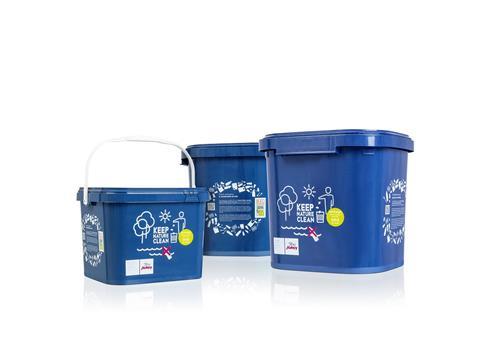
At the presentation of the management guide “eco design of plastic packaging” in Berlin on 12 June, Michael Schmitz, Head of Marketing and Communication, presented the current status of the Jokey Eco Concept.
IK Industrievereinigung Kunststoffverpackungen e. V. (Industrial Association for Plastic Packaging) had invited the participants to present a practice-oriented tool for companies in the form of the new guideline developed by “Runden Tisch Eco Design von Kunststoffverpackungen” (Eco Design Round Table for Plastic Packaging).
To mark the occasion, Michael Schmitz introduced the new Jokey buckets with ocean plastic content at the beginning of his brief presentation. The sea-blue containers in 35 and 10-litre sizes are the result of the latest series of tests to further develop the Jokey Eco Concept launched in 2017. The special feature: they consist of 25 percent recycled materials contained from plastic collections at ocean beaches. The remaining 75 percent are recyclates from household collections of recyclable materials.
For technical reasons, only the bucket handle is made from regranulates from the company's own production. According to Michael Schmitz, if the secondary raw materials from beach waste prove themselves in terms of quality, the material could in future be added to the conventionally obtained post-consumer recyclates.
"With the new buckets, we continue our long lasting development of a sustainable design. Since the 1990s, we have been processing secondary raw materials from post-consumer collections into new packaging for non-food industries," says Michael Schmitz. "The ocean plastic bucket as well as the management guide presented here focuses on achieving a fully comprehensive understanding of sustainable design".
In this sense, not only the sea blue of the new containers is meant to be an eye-catcher, but also the printed appeal: "Keep Nature Clean".The simple instructions for the lenient handling of plastic waste also aim to sensitise end consumers to the shared responsibility of keeping the recycling cycle intact.
"The protection of the environment and climate can only succeed as a task for society as a whole. The message of the bucket made of marine waste is: plastic is a valuable resource that must not end up carelessly in our nature neither on land nor in the oceans," says Michael Schmitz. In a first step, the RAL-certified ocean plastic buckets are to be used as waste collecting bins at schools; further enquiries have already been received.
The Jokey Eco Concept - a successful example of sustainable design
With a brief outline of the development of the Jokey Eco Concept, the marketing manager underlined that Jokey is very well positioned with regard to the strategic goals for sustainable design set by the industry association and the "Runden Tisch Eco Design von Kunststoffverpackungen" initiative.
Since the early 1990s, Jokey has reduced the weight of manufactured packaging by more than 30 percent with a view to optimising the use of resources, thus saving valuable raw materials and reducing the ecological footprint in logistics and transport. Jokey achieves sustainable material procurement by increasing the use of post-consumer recycled materials on the one hand and certified biopolymers on the other, provided these can be considered ecologically sensible. Jokey plastic packaging is 100 percent recyclable because it consists entirely of PP mono material and is free of foreign materials such as paper and metal. They can be used in an environmentally friendly way, as they can be completely emptied and used for private secondary use.
"As one of the world's leading manufacturers of plastic packaging, we have always felt a responsibility to constantly improve the ecological profile of plastic packaging. This also includes clear and targeted communication on how sustainability can be shaped along the entire value chain. On the manufacturer side as well as on the consumer side," sums up Michael Schmitz. "In view of the current social debate on climate protection, resource conservation and marine littering, we are increasingly in demand with our expert knowledge. We contribute this knowledge to the ongoing dialogue with associations and institutions - with an increasingly positive response".













